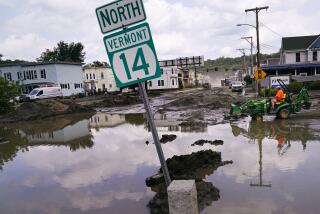Saving ‘Heaven’
- Share via
John Denver used to sing of West Virginia as “almost heaven.” Except, perhaps, for the considerable portion of the state systematically wasted by a primitive form of coal mining known as “mountaintop removal.” It’s a simple concept and cost-effective: Blast away the top of a mountain with explosives, bulldoze the rubble into the nearest valley or stream and mine the exposed coal.
This hellish practice was outlawed by Congress in 1977 but continued virtually unabated until a federal judge ruled last month that a large number of mines in West Virginia were violating the law. Mine owners were stunned by the prospect of having to obey the law and claimed that the decision of Chief Justice Charles H. Haden of the U.S. District Court would put them out of business.
Miners are protesting the job loss that would occur if the mines were closed. However, as the state looks to its future, coal is unlikely to be the energy source chosen by new industries.
Now to the rescue comes Democratic Sen. Robert C. Byrd, the son of a coal miner, who has represented West Virginia in the Senate for more than 40 years. He has made his state a fiefdom of special privilege when it comes to federal funding. In 1989, Byrd gave up his majority leader’s position in the Senate to take the job he really wanted, the chairmanship of the Appropriations Committee. There, he promised to become “West Virginia’s billion-dollar industry.” Byrd has more than delivered the pork, with projects such as an FBI office, an IRS center, a NASA research facility, a Fish and Wildlife Department training center and more.
He now is angling to attach a rider to a pending appropriations bill to overturn Haden’s ruling. Byrd is teaming with Sen. Larry E. Craig (R-Ida.), who has his own rider to allow the unrestrained dumping of thousands of tons of metal mining waste on federal and Indian lands in the West.
President Clinton has promised to veto any bill containing antienvironmental riders. But the administration at first indicated it would support Byrd’s mining measure, obviously wary of affronting a powerful fellow Democrat who could cause Clinton considerable grief on any spending measure. After environmental groups expressed appropriate outrage, the administration appeared to equivocate.
This should not be a difficult question for Clinton, no matter how great his fear of Byrd’s wrath. Eliminating or clogging streams and valleys with mining waste is blatantly against both the mining act and the Clean Water Act. It’s appalling that this outlaw practice has been allowed to continue on such a broad scale, obviously with a wink from federal and state mining officials. The president should support the ruling and see that it is vigorously implemented as soon as the appeals process is completed.
More to Read
Sign up for Essential California
The most important California stories and recommendations in your inbox every morning.
You may occasionally receive promotional content from the Los Angeles Times.













